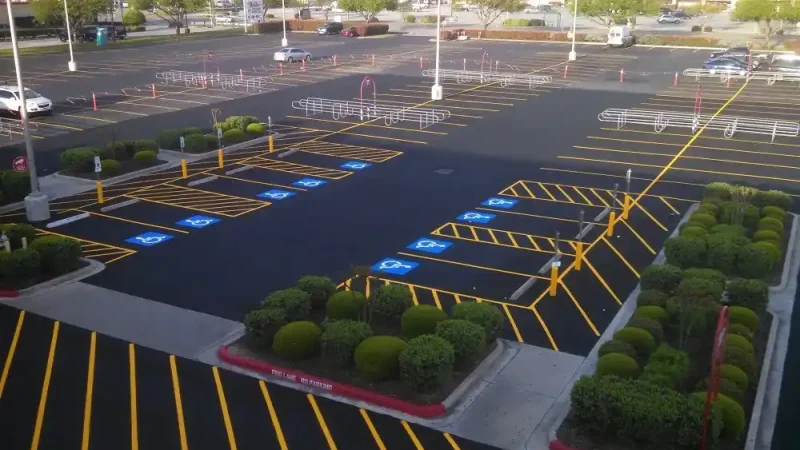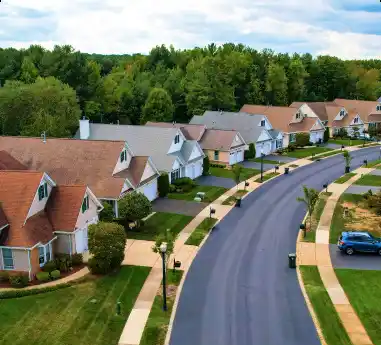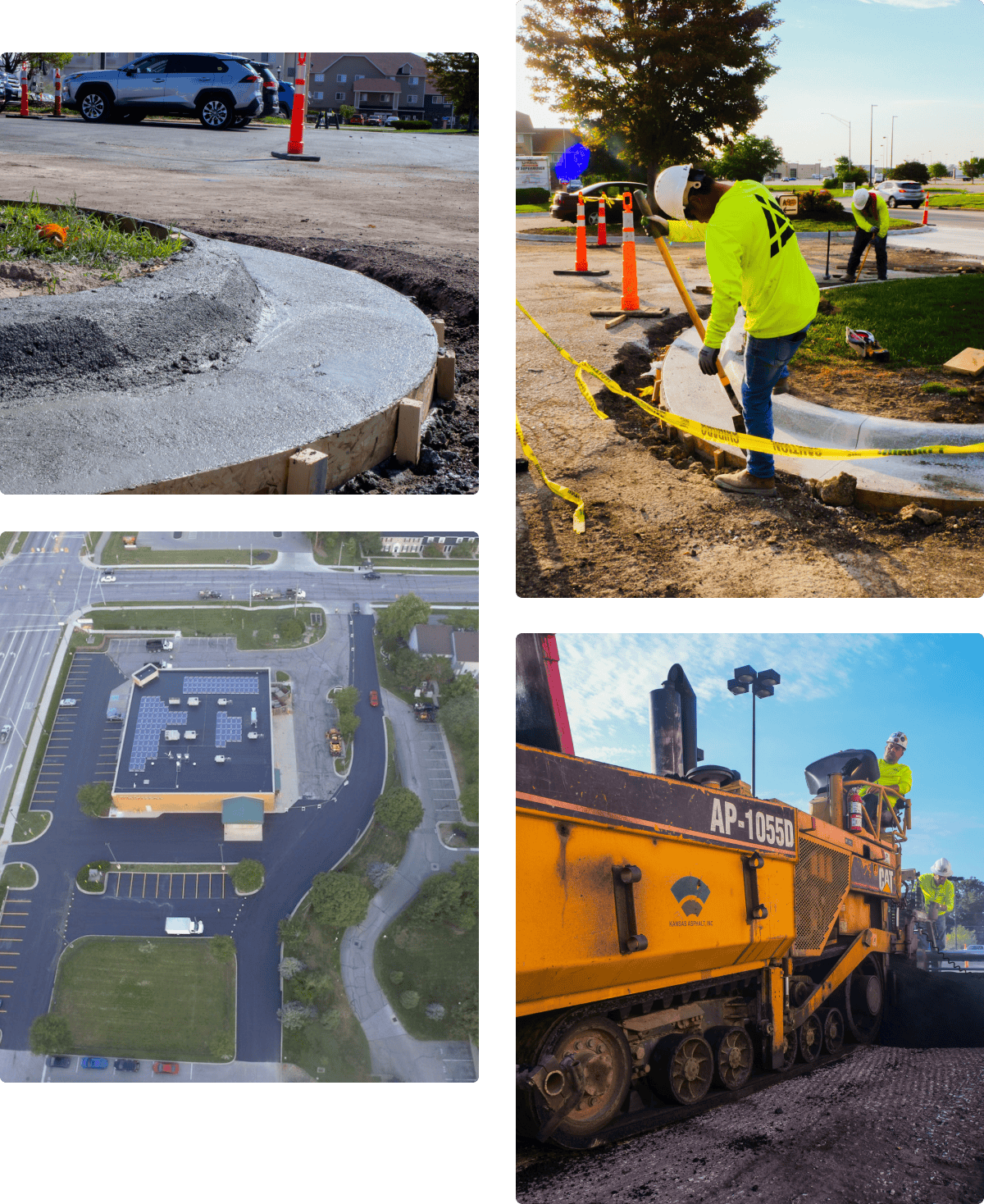
The Ultimate Guide to Parking Lot Maintenance in Kansas City
Your Local Guide to Asphalt Protection in the Heart of the Midwest
Maintaining a parking lot in Kansas City isn’t easy. Between freezing winters, humid summers, and constant temperature swings, asphalt surfaces face one of the most punishing climates in the country. Small cracks can quickly turn into potholes, drainage issues can lead to base failure, and neglected sealcoating can cost property owners tens of thousands in repairs.
At Kansas Asphalt, we’ve spent decades helping businesses, commercial property managers, and HOAs across the Kansas City metro protect their pavement investment with professional parking lot maintenance and repair services.
This guide breaks down everything you need to know about parking lot maintenance in Kansas City—from understanding freeze-thaw damage to scheduling preventive sealcoating at the right time of year.
Why Parking Lot Maintenance Matters
A well-maintained parking lot reflects your business’s professionalism and commitment to safety. Neglecting routine maintenance can lead to higher repair costs, safety hazards, and even liability issues.
Here’s why ongoing parking lot maintenance matters:
- Safety & Liability: Cracks, potholes, and uneven surfaces increase the risk of trip-and-fall accidents or vehicle damage. Regular inspections and timely asphalt repair services help prevent costly legal claims.
- Curb Appeal & First Impressions: Your parking lot is often the first thing visitors or tenants see. Fresh sealcoating and clear line striping instantly enhance your property’s appearance, fostering a welcoming environment.
- Cost Efficiency: Preventative maintenance can extend the life of your pavement by up to 50%, reducing the need for major reconstruction.
- ADA & Local Compliance: Maintaining a well-striped, marked, and accessible parking lot ensures ADA parking compliance and adherence to Kansas City’s municipal maintenance policies.
Think of parking lot maintenance as an investment—not an expense. The cost of minor repairs now is far less than the cost of premature asphalt replacement later on.
Contact Us
Fill out the form below, and a team member will contact you shortly.
How Kansas City’s Climate Impacts Your Asphalt
Kansas City’s Midwestern climate is the number one enemy of asphalt longevity. The city experiences dramatic freeze-thaw cycles—repeatedly freezing, thawing, and refreezing from late fall through early spring. By understanding how local weather patterns affect your pavement, you can schedule maintenance tasks at optimal times.
Freeze-Thaw Cycles
When water seeps into even the smallest cracks, it expands as it freezes, widening those cracks and damaging the pavement’s subbase. Over time, this cycle leads to cracking and pothole formation.
Salt and Deicing Chemicals
KC’s snow and ice removal practices often utilize salt and de-icing agents that can strip protective sealcoats and accelerate surface wear. These chemicals can also seep into cracks, weakening the underlying base layer.
Drainage and Heavy Rain
Kansas City averages 40 inches of rain annually, and poor drainage can lead to standing water and erosion. Proper grading, catch basin maintenance, and concrete paving and repair around curbs and sidewalks are key to preventing long-term structural damage.
UV and Heat Exposure
Hot summers bake the asphalt, causing oxidation and fading. Without regular sealcoating, UV rays cause the surface to become brittle and prone to cracking.
The Best Time of Year for Sealcoating in Kansas City
Sealcoating is one of the most important—and often misunderstood—asphalt maintenance tasks. It’s not just cosmetic; it acts as a protective barrier that shields your pavement from oxidation, moisture, chemicals, and UV rays.
When it comes to sealcoating in Kansas City, the job’s success depends almost entirely on timing and temperature.
Ideal Sealcoating Conditions
Sealcoating requires consistent warmth and dryness for proper curing. The Asphalt Institute recommends applying sealcoat when:
- Temperatures stay above 50°F for at least 24 hours, both day and night
- Surfaces are clean and dry, with no rain in the forecast for at least 24 hours
- Wind conditions are mild to moderate to prevent dust contamination
These criteria make late spring through early fall (May–September) the prime window for sealcoating in Kansas City. Attempting sealcoating too early or too late in the season can result in poor bonding and premature wear.
Why Timing Matters
Sealcoating every 3 years helps prevent surface deterioration, reduces oxidation, and extends the lifespan of your pavement by up to 50%. However, waiting too long between applications can cause small cracks to expand beyond the point of easy repair, forcing more costly patching or resurfacing work later on.
Kansas City property managers should develop pavement maintenance plans around predictable seasonal cycles. See the table below:
Kansas City Parking Lot Maintenance Calendar
| Season | Maintenance Focus | Why It Matters |
|---|---|---|
| Spring | Crack filling, patching, asphalt repair services | Fixes winter freeze-thaw damage before it worsens. |
| Summer | Sealcoating, line striping | Optimal curing temperatures ensure smooth, long-lasting finishes. |
| Fall | Preventive sealing, drainage cleaning | Prepares your lot for winter moisture and freeze protection. |
| Winter | Snow removal planning, plow safety | Prevents blade damage to curbs and freshly sealed surfaces. |
Scheduling preventive parking lot maintenance around Kansas City’s climate helps property owners save money and avoid emergencies. Many local businesses even align their maintenance with the Kansas City Street Preservation Program, which follows a similar rhythm to protect public roadways from freeze-thaw damage.
Local Regulations and Compliance for Kansas City Properties
More than aesthetics, parking lot repair and maintenance aligns your property with Kansas City’s safety and accessibility standards.
ADA Parking Requirements
Federal law requires that commercial properties have accessible parking spaces with proper signage, striping, and surface slope. If you’re restriping or resurfacing, review the ADA parking lot restriping compliance guide to ensure markings and gradients meet federal and local codes.
Drainage and Environmental Considerations
The Kansas City Public Works Department requires proper stormwater management for all paved commercial areas. Poor drainage not only violates city code but also accelerates base failure and erosion. Regular catch basin cleaning and concrete repair around curbs or sidewalks help you stay compliant.
Local Best Practices
Kansas City recommends resurfacing or sealcoating every few years to reduce long-term costs. This aligns with their pavement preservation initiatives, which emphasize early intervention over reactive repairs.
By staying ahead of regulations and environmental concerns, you’ll maintain a safe, accessible, and professional-looking property year-round without the stress of last-minute compliance updates.
Routine Maintenance Tips for Property Managers
Proactive property management can extend the life of your asphalt by years and significantly reduce the costs associated with asphalt repair in Kansas City. The key is staying consistent. Even small, routine actions can protect your investment and prevent costly downtime for your tenants or customers.
Here’s a simple 5-step maintenance checklist to keep your lot in top shape:
- Inspect Monthly: Walk the lot and note any cracks, oil stains, or standing water. Early detection prevents minor issues from becoming major repairs.
- Clean Regularly: Sweep debris and remove chemicals or oil spots that can break down sealcoat and asphalt binders.
- Check Drainage: Ensure catch basins and curbs are clear before spring storms or fall leaves cause blockages.
- Fill Cracks Promptly: Cracks over ¼ inch wide should be filled before water intrusion leads to potholes or subbase damage.
- Plan Preventive Work Annually: Schedule asphalt repair services during ideal weather windows—typically between May and September.

When to Call the Pros
Even the best maintenance routine can’t prevent every issue. Here are a few signs it’s time to bring in Kansas City’s local pavement experts:
- Cracks wider than 1 inch
- Pooling water after storms or snowmelt
- Uneven surfaces or sinking areas near catch basins
- Severe fading or peeling of line markings
- Recurring potholes in the same area
Local parking lot contractors in Kansas City understand how the region’s soil movement, drainage patterns, and temperature swings affect pavement performance. Working with an experienced contractor like Kansas Asphalt ensures every job is done safely, efficiently, and to code.


Why Choose Kansas Asphalt
Kansas Asphalt is proud to be a self-performing paving provider. Throughout your project, you’ll collaborate with our in-house teams, not subcontractors, for streamlined efficiency and communication. We guarantee consistent quality, safety, and accountability from start to finish.
What Sets Us Apart:
- Decades of local experience providing asphalt maintenance in Kansas City
- Comprehensive services including concrete paving and repair, sealcoating, ADA compliance, and line striping
- Preventative maintenance plans tailored to commercial properties
- Transparent communication and detailed project reporting
- Fast, efficient scheduling that minimizes downtime for your business
When you work with the Kansas Asphalt team, you’ll gain a proactive partner dedicated to preserving your property’s long-term value.
Conclusion: Protect Your Property Value Year-Round
Your parking lot is an opportunity to create a safe and welcoming first impression. With the region’s variable climate and busy commercial traffic, staying ahead of parking lot maintenance in Kansas City is essential.
By scheduling routine inspections, maintenance, and repair, you can extend your pavement’s life, reduce liability, and maintain a clean, professional appearance all year long.
Contact Kansas Asphalt to request a free estimate and take the first step towards long-lasting parking lot performance.


